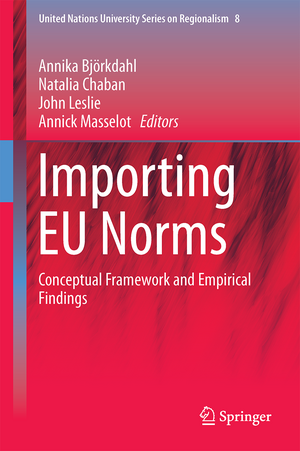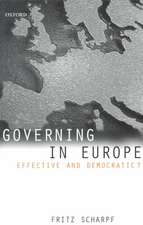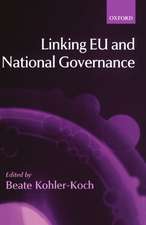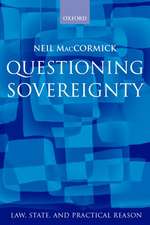Importing EU Norms: Conceptual Framework and Empirical Findings: United Nations University Series on Regionalism, cartea 8
Editat de Annika Björkdahl, Natalia Chaban, John Leslie, Annick Masseloten Limba Engleză Hardback – 31 mar 2015
| Toate formatele și edițiile | Preț | Express |
|---|---|---|
| Paperback (1) | 386.81 lei 6-8 săpt. | |
| Springer International Publishing – 6 oct 2016 | 386.81 lei 6-8 săpt. | |
| Hardback (1) | 394.12 lei 6-8 săpt. | |
| Springer International Publishing – 31 mar 2015 | 394.12 lei 6-8 săpt. |
Din seria United Nations University Series on Regionalism
- 15%
 Preț: 647.27 lei
Preț: 647.27 lei - 24%
 Preț: 790.70 lei
Preț: 790.70 lei - 18%
 Preț: 738.20 lei
Preț: 738.20 lei - 15%
 Preț: 645.47 lei
Preț: 645.47 lei -
 Preț: 393.35 lei
Preț: 393.35 lei -
 Preț: 395.09 lei
Preț: 395.09 lei - 15%
 Preț: 647.08 lei
Preț: 647.08 lei - 15%
 Preț: 651.67 lei
Preț: 651.67 lei - 18%
 Preț: 893.05 lei
Preț: 893.05 lei - 15%
 Preț: 641.20 lei
Preț: 641.20 lei -
 Preț: 442.46 lei
Preț: 442.46 lei - 18%
 Preț: 721.81 lei
Preț: 721.81 lei -
 Preț: 425.42 lei
Preț: 425.42 lei - 15%
 Preț: 646.11 lei
Preț: 646.11 lei - 18%
 Preț: 783.68 lei
Preț: 783.68 lei - 15%
 Preț: 690.94 lei
Preț: 690.94 lei - 15%
 Preț: 691.91 lei
Preț: 691.91 lei - 18%
 Preț: 727.80 lei
Preț: 727.80 lei - 18%
 Preț: 797.24 lei
Preț: 797.24 lei - 20%
 Preț: 560.30 lei
Preț: 560.30 lei - 15%
 Preț: 636.12 lei
Preț: 636.12 lei - 18%
 Preț: 940.09 lei
Preț: 940.09 lei - 20%
 Preț: 577.17 lei
Preț: 577.17 lei - 15%
 Preț: 642.51 lei
Preț: 642.51 lei -
 Preț: 391.61 lei
Preț: 391.61 lei
Preț: 394.12 lei
Nou
Puncte Express: 591
Preț estimativ în valută:
75.43€ • 78.46$ • 63.21£
75.43€ • 78.46$ • 63.21£
Carte tipărită la comandă
Livrare economică 14-28 martie
Preluare comenzi: 021 569.72.76
Specificații
ISBN-13: 9783319137391
ISBN-10: 3319137395
Pagini: 300
Ilustrații: X, 262 p.
Dimensiuni: 155 x 235 x 20 mm
Greutate: 0.56 kg
Ediția:2015
Editura: Springer International Publishing
Colecția Springer
Seria United Nations University Series on Regionalism
Locul publicării:Cham, Switzerland
ISBN-10: 3319137395
Pagini: 300
Ilustrații: X, 262 p.
Dimensiuni: 155 x 235 x 20 mm
Greutate: 0.56 kg
Ediția:2015
Editura: Springer International Publishing
Colecția Springer
Seria United Nations University Series on Regionalism
Locul publicării:Cham, Switzerland
Public țintă
ResearchCuprins
Chapter 1. Introduction: To Take or Not to Take EU Norms? Adoption, Adaptation, Resistance and Rejection; Annika Björkdahl, Natalia Chaban, John Leslie and Annick Masselot.- Part I. Adoption.- Chapter 2. A Selective and Reluctant Adopter: The Czech Republic and its (Non)Accession to Schengen and Eurozone; Ivo Šlosarčík .- Chapter 3. Mobility in Principle and Practice: Multilevel Adoption of Free Movement Norms in a European Cross-Border Region; Toni Grace.- Chapter 4. The EU and Global Economic Governance: Playing the Role of a global Leader?; Rikard Bengtsson.- Part II. Adaptation.- Chapter 5. Perceptions of ‘Normative Power Europe’ in the Shadow of the Eurozone Debt Crisis: Public Perspectives on European Integration from the Asia Pacific; Natalia Chaban, Serena Kelly and Martin Holland.- Chapter 6. From One Single Market to Another: European Integration, Australasian Ambivalence and Construction of the Trans-Tasman Single Economic Market; John Leslie and Annemarie Elijah.- Chapter 7. Moving Freely, But Taking a Different Route: Comparing Tran-Tasman and European Union Norms of Human Mobility; Kate McMillan.- Chapter 8. Exporting Hard Law through Soft Norms; W. John Hopkins and Henrietta McNeill.- Part III. Resistance.- Chapter 9. The EPA-Negotiations: A Channel for Norm Export and Import?; Annika Björkdahl and Ole Elgström.- Chapter 10. Ambitions versus Capacity: The Role of Institutions in ASEAN.- Chapter 11. Reception of EU Trade Mark Law in New Zealand; Alison Firth.- Part IV. Chapter 12. The Value of Gender Equality in EU-Asian Trade Policy: An Assessment of the EU’s Ability to Implement its Own Legal Obligations; Maria Garcia and Annick Masselot.- Chapter 13. Russia's Complex Engagement with European Union Norms: Sovereign Democracy versus Port-Westphalianism; James Headley.- Chapter 14. The Diffusion of EU Norms to China: The Case of Tibet; Wenwen Shen.- Chapter 15. Conclusion: Annika Björkdahl, Natalia Chaban, John Leslie andAnnick Masselot.
Recenzii
This volume fills a major gap in our understanding of the European Union’s normative power with its focus on the perceptions of third party recipients of EU norms and values. The editors have produced a book that combines conceptually strength with empirical richness to addresses an academic lacunae on the EU’s norm takers to excellent effect.
Professor Richard G. Whitman
Professor of Politics and International Relations
Director, Global Europe Centre
University of Kent
This exceptional volume makes a significant theoretical and empirical contribution to the research agenda on normative power by examining thirteen case studies in the impact of the cultural filter on EU norm diffusion. A genuinely rich diversity of scholars and case studies from across the world, including European, African, Australasian, Asian and global analyses, develop the cultural filter of EU norm adoption, adaption, resistance or rejection to excellent effect. Through an analytical emphasis on how the EU is received and perceived in the rest of the world, the volume makes an original and ground-breaking contribution to understanding the reflexive nature of EU norm diffusion and normative power.
Professor Ian Manners,
Department of Political Science,
University of Copenhagen
Professor Richard G. Whitman
Professor of Politics and International Relations
Director, Global Europe Centre
University of Kent
This exceptional volume makes a significant theoretical and empirical contribution to the research agenda on normative power by examining thirteen case studies in the impact of the cultural filter on EU norm diffusion. A genuinely rich diversity of scholars and case studies from across the world, including European, African, Australasian, Asian and global analyses, develop the cultural filter of EU norm adoption, adaption, resistance or rejection to excellent effect. Through an analytical emphasis on how the EU is received and perceived in the rest of the world, the volume makes an original and ground-breaking contribution to understanding the reflexive nature of EU norm diffusion and normative power.
Professor Ian Manners,
Department of Political Science,
University of Copenhagen
Textul de pe ultima copertă
This interdisciplinary work presents a conceptual framework and brings together constructivist and rationalist accounts of how EU norms are adopted, adapted, resisted or rejected. These chapters provide empirical cases and critical analysis of a rich variety of norm-takers from EU member states, European and non-European states, including the rejection of EU norms in Russia and Africa as well as adaptation of EU practices in Australia and New Zealand. Chapters on China, ASEAN and the Czech Republic demonstrate resistance to EU norm export. This volume probes differences in willingness to adopt or adapt norms between various actors in the recipient state and explores such questions as: How do norm-takers perceive of the EU and its norms? Is there a ‘normative fit’ between EU norms and the local normative context? Similarly, how do EU norms impact recipients’ interests and institutional arrangements? First, the authors map EU norm export strategies and approaches as they affect norm-takers. Second, the chapters recognize that norm adoption, adaption, resistance or rejection is a product of interaction and a relationship in which interdependence, asymmetry and power play a role. Third, we see that domestic circumstances within norm-takers condition the reception of norms. This book’s focus on norm-takers highlights the reflexive nature of norm diffusion and that nature has implications for the EU itself as a norm exporter. Anyone with an interest in the research agenda on norm diffusion, normative power and the EU’s normative dialogue with the world will find this book highly valuable, including scholars, policy makers and students of subjects including political science, European studies, international relations and international and EU law.
Caracteristici
Presents a conceptual framework and empirical cases of the EU as an ‘exporter of norms’, which are linked to that framework Examines the effectiveness of norm export and evaluates to what extent it is enhanced or inhibited by different transfer mechanisms Provides comprehensive analyses and comparisons of EU's norm export in a wider geographical setting, both within and beyond Europe’s neighbourhood Includes supplementary material: sn.pub/extras



















